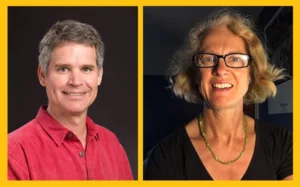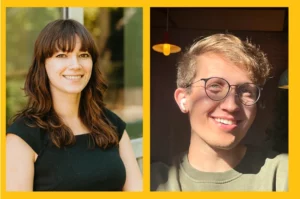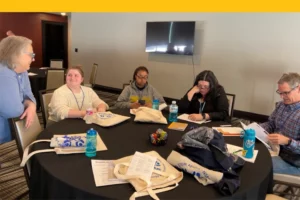Jillian Cervantes, who is graduating this month with a major in Mathematic Sciences, is described by her mentors as a gifted mathematician and a talented teacher. She also has ADHD.
She didn’t receive her diagnosis until she was an adult, but when she did, the symptoms she experienced throughout her childhood suddenly made sense.
“Misinformation (about ADHD) is so prevalent,” Cervantes said. “Like, if you’re good at school, you must not have ADHD or any sort of disability. I always got my homework done, (but it was) because I was always so stressed and anxious.”
To help her manage her disability, Cervantes has several accommodations in her classes at UWM. She can ask her professors for extensions on her assignments if she needs it, and she is allotted extra time and a quiet room to take her tests. She can study the course materials in advance, and she uses an iPad in class to record lecturers and take notes at the same time.
To help her manage the isolation that comes with her disability, Cervantes has found TAPDINTO-STEM.
TAPDINTO-STEM is a program through the National Science Foundation that creates social spaces and provides mentoring and funding for students with disabilities who are studying science, technology, engineering, or math (STEM) subjects. UW-Milwaukee’s TAPDINTO-STEM program was established in 2022, and the program is rounding out its second year.
“I found out about TAPDINTO-STEM in the first semester that I got academic accommodations at UWM,” said Cervantes, who is a mathematical sciences major. “I was figuring out how to navigate my accommodations package and what it means to be a student with disabilities. I thought this would be a good way to meet other people.”
That is perhaps the biggest benefit to being in the program, Cervantes added: She knows she is not alone.
Making a safe space
The NSF has several programs designed to increase representation in STEM subjects under the umbrella of the “Inclusion across the Nation of Communities of Learners of Underrepresented Discoverers in Engineering and Science” (INCLUDES). These have focused on women and minorities, but about five years ago, the NSF added TAPDINTO-STEM to its roster to support students with disabilities. Currently, 35 different institutions across the United States, including UWM and Milwaukee Area Technical College, are part of the TAPDINTO-STEM program network.

“The idea was to create places for students in STEM subjects who have disabilities, to change the culture of our science programs to not simply accommodate, but to welcome and support students who have various disabilities,” said John Berges, a Professor of Biological Sciences. He and his spouse, Biological Sciences Professor Erica Young, brought the program to UWM’s campus. The mission is personal; the couple’s son has a disability, as does Berges’ sister. They witnessed the struggles of their loved ones in education and wanted to help ease the way for others.
Of course, UWM’s Accessibility Resource Center helps students with disabilities navigate the accommodations they need to be successful during their time at college. That can include accommodations for physical limitations, if a student is hard-of-hearing or has mobility issues, for example, or for invisible disabilities, like dyslexia, ADHD, or anxiety disorders.
TAPDINTO-STEM provides an extra layer of support and connection, said Berges. STEM students who have accommodations through the ARC, like Cervantes, are invited to apply for the program at the beginning of the school year. The cohort of about 10 students meets monthly.
“There have been meetings where I’m on the verge of tears because these guys are willing to be very open about what they’ve experienced,” Berges said. “There are some real bonds that form.”
Berges and Young also strive to make TAPDINTO-STEM a conduit for information where their group can learn about available resources on campus, meet with people like the UWM ARC director or UWM faculty members with disabilities, or network with employers who can give insight into the accommodations that they build into their hiring and on-boarding practices.
“Some of our regional banks are actually really interested in hiring people with disabilities because they find, for some students who have various forms of autism … they bring unique and valuable skills, including being able to concentrate and focus much more acutely than others,” Berges pointed out.
Beyond its students, TAPDINTO-STEM is also a way that Berges and Young can spread disability awareness among UWM’s faculty, staff, and administration. They are working to establish partnerships with student groups on campus, including the UWM chapter of DREAM (Disability Rights, Education, Activism, & Mentoring), a group for college students with disabilities. They are also working to provide education for instructors and spread awareness about the ARC’s Certificate in Accessibility, which is offered in conjunction with UWM’s Center for Excellence in Teaching and Learning. While most faculty and staff are understanding of their students’ needs, some have reported that their teachers have been skeptical of their accommodations.
“It’s a work in progress,” Young noted. “We’re contemplating how we could built networks of instructors and people who have experience in understanding this, that students can go to for help.”

Reaping the benefits
For biomedical sciences major Ben Nelson, TAPDINTO-STEM has been not only a source of a community, but a source of confidence as well. He has participated in the program for the past two years and plans to return next fall. He has Type-1 diabetes and needs accommodations to be able to safely monitor his blood glucose levels in class.
“We had a lot of great, judgment-free discussions about the kind of experiences we were having at UWM and what we could do to make those experiences different. That leads into how empowering TAPDINTO-STEM has been,” Nelson said. “Overall, it’s bolstered self-confidence for everyone. It teaches us to not hide the fact that we’re disabled. It teaches us not to avoid talking to instructors.”
Cervantes agreed.
“For me, it’s knowing I have people in my corner. I feel very empowered in that way,” she said.
She also appreciates that students receive a stipend for participating in the program; often, she said, disabilities make it difficult for students to hold down a job and succeed in their classes. Having the extra support is helpful.
The program also benefits the university, Berges and Young argue. TAPDINTO-STEM and UWM’s Accessibility Resource Center are important tools for students and should be a bigger part of the picture when it comes to recruiting new students, they said.
Because whatever a student’s disability may be, it shouldn’t hold them back from achieving their academic dreams.
By Sarah Vickery, College of Letters & Science
